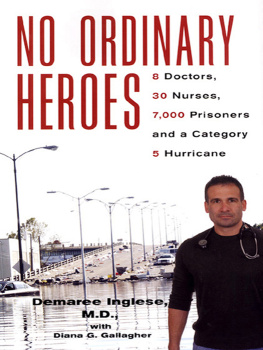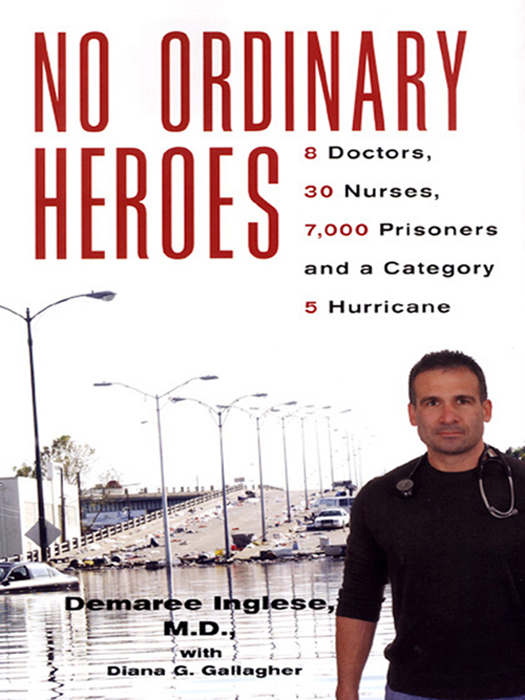NO ORDINARY HEROES
8 Doctors, 30 Nurses, 7,000 Prisoners, and a Category 5 Hurricane
Demaree Inglese, M.D.
with Diana G. Gallagher

CITADEL PRESS
Kensington Publishing Corp.
www.kensingtonbooks.com

To my mother and father, who gave me
unconditional love and taught me that anything
was possible if I worked hard enough.
DI
With love and gratitude to family and friends
who have helped me realize my writing ambitions.
DGG
Acknowledgments
This is a true story. I interviewed many people to gather the information necessary to construct an accurate timeline and reliably re-create dialogue, especially in situations where I myself was not present. I would like to express my gratitude to the many medical personnel who submitted to endless hours of questioning: Cheryl Blake, Kentrisha Davis, Yolanda Dent, Marcus Dileo, Carol Evans, Hedy Hartzog, Lakesha Favis, Lillian Ford, Gary French, Robert Gates, Samuel Gore, Michael Higgins, Pebles Jones, Scarlatt Maness, Chuck Perotto, Daphne Powell, Jan Ricca, Brady Richard, Denise Sarro, Paul Thomas, Duane Townzel, and Victor Tuckler. I am also indebted to the security personnel from the Orleans Parish Criminal Sheriffs Office who assisted me: Jim Beach, Gary Bordelon, Robert Brown, William Devlin, Mary Goodwin, Gerald Hammack, Sidney Holt, William Hunter, Chuck Jones, Mary Baldwin Kennedy, John Lacour, Matthew Mills, and John Phillips.
I would like to thank the individuals who furnished photographs for the book: Jim Beach, William Devlin, Samuel Gore, Michael Higgins, John Netto, Jan Ricca, David Skeins, Pam Laborde and Charles Warren from the Louisiana Department of Corrections and Public Safety, and Patrick Garin Photographer. Also, Jarred Zeringue provided the excellent maps that appear in the book.
While I cannot possibly thank all of the incredible security personnel who fought to keep inmates, staff, and civilians safe during our ordeal, I would like to express my appreciation to the Correctional Center deputies I worked with personally. We owe these brave men and women a great deal, possibly our lives: Danny Boersma, James Brunet, Shandreka Cobbins, Chris Dietz, Patricia Ross, Richard Skyles, Allen Verret, and Lance Wade. I would also like to express my appreciation to Louisiana Attorney General Charles C. Foti, Jr. and Louisiana Secretary of Corrections Richard L. Stalder for their assistance in evacuating everyone from the jail.
I want to acknowledge my friends Tony Guidry and Jerremy Brum, who took Sam Gore and me in after our departure from Houma. Later, they supported me with friendship and a place to bunk when I first returned to Louisiana. I also want to thank Sheriff R. Jack Strain, Jr., for providing me with food and lodging for weeks after the storm.
I will forever be indebted to Jerry Purcell, who opened his home to me for many months while my own house was being renovated. In addition, his technical support was invaluable to me as this project developed.
I would like to thank Joan Tapper, who assisted with shaping and sharpening the narrative, my agent, Tim Wager, who supported this project from its inception, and my editor, Michaela Hamilton, who helped guide this book to publication.
I must mention my longtime friend, Betsey Wilcox, without whom this book would not have been possible. Betsey introduced me to my coauthor, Diana G. Gallagher, and provided encouragement as we struggled to tell this story.
Finally, Diana Gallagher and I were truly equal partners in the writing of this book. Her ideas and experience were essential, and it was both a privilege and a pleasure to work with her.
Contents
Prologue: Wednesday, August 31, 2005
It was late afternoon, and I just wanted a few minutes of downtime. For the skeleton medical staff of the New Orleans jailthirteen buildings that housed the citys 6,400 criminal inmatesthe sixty hours since Hurricane Katrina had hit us had been a nightmare. The ordeals wed faced made my tour of duty as an air force doctor in Korea seem like summer camp.
Only four days ago my biggest headache as medical director was how to notify the family of an inmate who had died after a long illness. Now I looked across the lobby of the Community Correctional Center, the command center for the jail complex, at the makeshift clinic wed managed to set up. I wondered how much longer we could hold out. We had handled a stream of life-threatening emergencies that beset the hundreds of deputies and civilians who worked or had taken shelter here. But now hundreds of increasingly rebellious and dangerous inmates had begun to break out of cells on the upper floors. No relief was in sight.
My colleagues were working in the temporary pharmacy that once served as a computer room. In the six years Id been employed at the jail, Id never doubted my doctors or nurses, but Katrina had brought out the best in them, a resourcefulness and tenacity I might never have seen otherwise.
All afternoon the cinderblock walls of the building had reverberated with inmates banging and shouting from the floors above, but things seemed quiet for the moment. It was the right time to snatch a few minutes of rest outdoors.
The stench from the restrooms along the back wall made me move faster toward the glass doors that led to the broad, roofed porch. We hadnt had power for two days, but there was ample light coming into the lobby. Still it was tricky to get around the mass of people and the mounds of disheveled clothes, toys, mattresses, and other stuff that marked the spaces they had claimed as their own. My cargo shorts and T-shirt were damp with sweat that never seemed to dry in the New Orleans humidity, and when I rubbed my chin, I scraped a three-day beard that itched in the heat. A breeze outside would be welcome, I thought as I headed for the porch.
The sound of the heavy security door opening behind me stopped me cold. I looked back as Captain Allen Verret and his deputies rushed out from the stairwell that led up to the inmate floors.
Out! Verret ordered. Everybody out, now! As acting warden, he had total charge of this building, and his voice was so commanding no one would have thought to disobey.
When the last man cleared the door, Verret shoved it closed and locked it.
Only one thing could have put him in such a panic: inmates on the loose.
Verret began barking orders, and the deputies rushed to carry them out. Everyone working in the nearby control room and around the lobby dropped what they were doing and mustered at the information desk.
Get the civilians out of here! Verret yelled. The inmates are coming down. Move these people out of the buildingnow!
Confusion stunned the crowd for a moment, but the deputies didnt have to urge anyone to leave. People swarmed through the doors onto the porch. The thick walls buffered the sounds of shouts and pounding in the stairwell, but even so, the noise grew louder and rapidly closer. I moved toward the clinic to warn my doctors and nurses.
Get your staff outside, Doc, Deputy Skyles called to me. Therere too many inmates coming down. We wont be able to hold them off! His voice was steady, but fear glinted in his eyes.











